The Business Journal held our Next Generation Roundtable on May 14 at The Courtyard by Marriott, Canfield.
Participants were Jacob Rickert, director of workforce development at Penn-Northwest Development Corp., Hermitage, Pa.; Paige Genova, founder and owner of Vital Pelvic Health & Wellness, Poland; Nico Morgione, associate director for business development with the STEM College at Youngstown State University; Kaneesha Ellen Tensley, an officer with Boardman Police Department; Levi Smith, budget administrator at YSU; ShoMoré Wright, regional liaison, Canvass America; Shea MacMillan, broker, Platz Realty Group; Katie Cretella, director of clinical services, Trumbull County Mental Health & Recovery Board; Betsy Bresnahan, marketing manager, DGPerry, Canfield; Tyler Wolfe, regional manager, Winner Aviation, Vienna; Gina Peplow, Jobs for Ohio’s Graduates.
Leading the questions was Andrea Wood, publisher of The Business Journal. Videographers Maggie Young and Steve Peterson recorded the conversation that can be viewed at BusinessJournalDaily.com. Associate editor George Nelson shot the photos of the participants as they answered Wood’s questions. Reporter Denise Dick wrote the synopsis that appeared online. Copy editor Dennis LaRue condensed and edited the responses taken down verbatim by Mary J. Carney, registered merit (court) reporter.
The Business Journal: Tell a little bit about yourself, your organization and how you’re trying to provide the next generation of leadership.
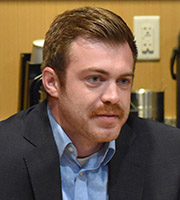
Jacob Rickert, director of workforce development at Penn-Northwest Development Corp., Hermitage, Pa.: I grew up in Greenville, Pa., stayed within Mercer County my whole life excluding four or five years for military service. In my day-to-day work, we created a program, the Homegrown Initiative, to help retain young adults in our area.
It’s led entirely by other young adults, which we call the future leaders. It’s young men and women that act as the guiding body for all the decisions we make to help further retain young adults, whether they grew up in Mercer County or came here to get their education.
Paige Genova, pelvic-floor occupational therapist and founder of Vital Pelvic Health & Wellness, Poland: I grew up in Columbiana. Outside of my schooling, I came back to the Youngstown area because I felt strongly that we needed better health care, specifically pelvic health care. My clinic treats only pelvic-floor dysfunction. That’s pretty different for this area.
Most rehab clinics are the traditional rehab clinic that you’ve seen before. We’re very different and it was purposeful.
And I hope to continue to grow my clinic to reach more people and to establish ourselves as the area leader so that people don’t have to travel far for great world-class health care, to provide better jobs for therapists because the streets are tough out there in health care, good jobs for therapists and other people passionate about helping people.
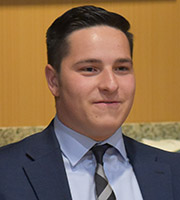
Nico Morgione, associate director for business development and industry partnerships in the College of Science, Technology, Engineering and Mathematics at Youngstown State University: … Born and raised in the Mahoning Valley, currently living in Canfield. Went to Ursuline High School, went to YSU for my undergrad and my master’s.
And the leader that I want to be: someone other young adults, young professionals in this region can look to and say, “I don’t need to move away. I can live here. I can get a good job.”
Additionally, I play in a local band; that’s a lot of fun. I’m very passionate about this area, this region. We’re on a great path and the best is yet to come.
Levi Smith, a budget administrator at Youngstown State University: I work with the YSU Honors College, the office of community engagement and the Tressel Institute for Leadership and Teamwork. Through that, and growing up working in my family’s fields, my sole goal is servant leadership.
I also have a couple of companies that I run. I try to lead by demonstration and always cheer my team on from the back.
And then the Tressel Institute for Leadership and Teamwork is an institute that teaches soft skills to students to help them understand the things they need to enter the workforce.
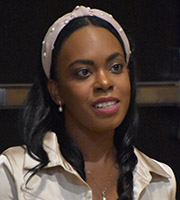
ShoMoré Wright, regional liaison with the office of the Ohio secretary of state for five years, now for Canvass America and a yoga instructor: … As regional liaison, I was in charge of 12 counties, worked with boards of elections, chambers of commerce, Youth at the Booth, helping to get young people engaged in voting.
I learned from being a liaison that transparency is very important. That’s the type of leadership I want to continue to provide: honest, clear, open, honest.
Shea MacMillan, broker, Platz Realty Group: At Platz, we solely focus on commercial and industrial real estate and are very ingrained in the Mahoning Valley.
… In my former role at the Youngstown/Warren Regional Chamber, I was the vice president of economic development. There I was able to collaborate with really impressive people in workforce development, project management and industrial projects. I was able to help facilitate site selection for Ultium Cells here and navigate incentives for the Macy Distribution Center in North Jackson.
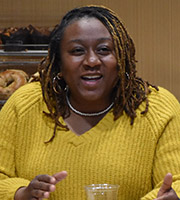
Kaneesha Ellen Tensley, an officer with Boardman Police Department: … As a leader I want everyone to know that you have other choices.
I find that the younger generation often believes, “I can only do this.” One of my goals is to let young people know, “You can do more than only this. You can do anything.” I want to be that motivation for them.
A little background: I enjoy making rugs, tufting. I have my 9-year-old son. And basketball is my game. I went to Ursuline High School. I want to continue to be a light for the Mahoning Valley and this area to bring in more opportunities.
Katie Cretella, director of clinical services at the Trumbull County Mental Health & Recovery Board: I am a lifelong resident of Trumbull County. I completed my education at Youngstown State University and have remained in this area and worked within the community between Trumbull and Mahoning County.
In my role at the mental health & recovery board, I oversee mental health programming throughout Trumbull County and oversee its programs through our contracted providers. And I lead the Trumbull County Suicide Prevention Coalition.
So my goal is to lessen the stigma about mental health treatment for those seeking such treatment while increasing access and decreasing barriers.
Betsy Bresnahan, marketing manager with DGPerry, Canfield: … We’re a regional accounting firm. We support eight offices and about 175 employees just here.
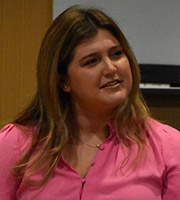
I’m from the area, a graduate of Boardman High School. For college I went away to West Virginia University and moved to Chicago after graduation. In 2018, I moved back to the area. There’s no place like home. I’m proud to be from Youngstown.
And the leader that I want to be? I want to be an example that you can come back here. There’s a lot of great opportunities here in Youngstown. People have the attitude, “I want to go out and see something new”; and that’s great. But you can always come home. And there’s a lot of great people here, a lot of great organizations. We would welcome you back to Youngstown.
Tyler Wolfe, regional manager for Winner Aviation: Winner Aviation serves the business community on one side, does maintenance on private jets. On the other side, that’s where I primarily work. We work across the nation with various airlines to provide services on the ground-handling side for customers traveling around the country.
A little bit about me: Leadership is definitely a passion of mine. I’m a John Maxwell coach, speaker, and trainer. Outside of work, my passion, as a young leader, is to help people develop into the leaders that they want to be and serve as an example.
Gina Peplow, Jobs for Ohio’s Graduates: … We work with youth ages 14 to 24 to overcome barriers to employment and academic success. I am from Warren, born and raised. I graduated Warren Harding, then went to Youngstown State University. And then I just finished my master’s degree in management and leadership last December.
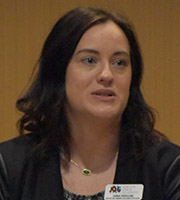
I look forward for leadership to develop our youth so they can get beyond the barriers in front of them. A lot of the youth I work with are 200% below the federal poverty guideline. Many are in low socioeconomics spheres where they don’t have access to many resources.
I was one of those youths. So now I can go to them and say, “You can move beyond where you are.” It’s not what you control under 18 – it’s what you do after 18 and how you build yourself and your life.
Business Journal: You are part an awesome group of young leadership. You’re obviously the next generation. What sets you apart? Why did you decide to get into leadership? Why did you stay in the Mahoning Valley? Why did you come back? What can you tell other young people about why they should come here or why they shouldn’t leave?
MacMillan, Platz Realty: We’ll probably hear this word a lot: family.
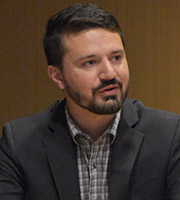
I went to YSU for economics. I wanted to get into monetary policy. I was focused on going to Cleveland and working for the Fed. And a lot more people talk about the Fed than they did back when I was thinking of working for them.
But the more I started going to YSU and I started meeting really impressive leaders in our community and getting a sense of the size of our community, I wanted to be a part of world building rather than going to a place that was already well-established.
There’s a lot more excitement and a lot more things to be proud of when you’re collaborating to uplift something.
Anybody can go to a community that has countless jobs and go to Columbus and work for Intel. But the level of collaboration and camaraderie that you can facilitate here with a bunch of passionate people is awesome. That’s what kept me here.
Morgione, YSU: A lot of people, especially those graduating from school, when they’re deciding where they’re going to go after college, or high school, or entering the work force – it seems there’s a level of skepticism about everything that comes to this region.
And there’s [based on] the past. We hear about the steel mills. We hear about the automotive industry. That’s coming back. But we hear about Chill Can.
We hear about time after time that companies have come and gone. And we don’t celebrate the wins enough.
And a perfect example: the people who know about the wins celebrate them. If you go to the Regional Chamber events or any of the local economic development or regional impact events, you see the same faces. You know that that group of people knows what’s happening.
But something needs to be done that gets the message across to others.
I know firsthand – and we can all speak to this – that upon graduating [staying here] wasn’t even a consideration. My friends were looking at jobs only in Pittsburgh and Cleveland. They weren’t even applying for jobs in this region.
We’ve seen a huge generational shift in the idea of going to college and trade schools. It’s something that’s perpetuated by grandparents, parents, now the next generation. And that idea builds.
“I need to go to college. It’s the only way I can get ahead.” It’s part of the thinking, “There aren’t any opportunities in Youngstown, in Warren. I need to get out of Youngstown. I need to move. If I’m going to be successful, I can’t be here.”
That perpetuates itself in the classroom, from the house, even from peer groups.
So getting the word out about the wins is big. YSU has a great nursing program. And yet a ton of the nursing students are going to Columbus, Cleveland, Akron, Pittsburgh. And then you have downtown Youngstown St. E.’s giving bonuses because they can’t find nurses. There’s a disconnect for sure.
Tensley, Boardman Police: One thing that keeps me here is definitely family. But one of the main things is this area is a blank canvas. You give me a blank canvas. Now I’m thinking: I can do anything. Let me see what I can do.
Youngstown is a blank canvas to do what you want. You can start a business and still live because things are affordable. That’s one of the biggest things for me.
There are so many empty spaces, a lot of voids. It’s our job to point out, “There’s a vacancy here.” To fill a void. To get things out.
That’s one thing that keeps me here. I grew up and saw [the leadership of] Mayor Jay Williams and Wendy Webb, the [former] superintendent of Youngstown City Schools. I want to fill that gap and to stand in their shoes.
Now that I’m older, I have the opportunity to do so and be on that platform. So, just tell everybody: It’s a blank canvas. You can do whatever you want, literally.
Peplow, Jobs for Ohio’s Graduates: Something I speak to with our youth, knowing what it was like to be in their shoes, is why leave an area that you want to see change? You can’t make change happen from afar. So stay here and build the community that raised you. Because you have roots here. And if we want to make changes, we have to do it together.
If you grew up in Section 8 housing or in underdeveloped zones, you know the inherent challenges, like transportation, food deserts. So why not try to make a difference, to make change happen for those coming up behind you.
Business Journal: What’s the response?
Peplow, Jobs for Ohio’s Graduates: I hear a lot of passion. Some of them, unfortunately, a lot of the youth I work with, think they won’t live to 25. So what I have to say to them is they have a lot of life left. And if you want to make a difference, I can be the guide to help you start.
Hopefully we can see them move forward. It’s just lack of resources right now. But they want to get educated on how to fill in those blanks.
Genova, Vital Pelvic Health & Wellness: To build on what Gina and Kaneesha were talking about, I’m not sure if I’m the only one here that has her own business. But, it is quite doable to start your own business in Youngstown. And I had no business background at all.
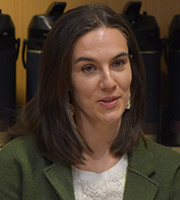
Never took a business class. I was an occupational therapist, was trained to be a good worker bee, to bill insurance companies and that was it. That’s what we are trained to do in health care: Help people but do it in a way that is profitable for businesses and insurance companies.
The idea of starting a business wasn’t something that I ever had in my mind. But when I got out of the traditional health care system and out of the hospital system, my eyes were opened to how many resources there were in Youngstown, how much community support there is in Youngstown from other local businesses, and how many local businesses there are in Youngstown.
It gave me that green light; I can do this. I have no business background but I have a passion. There is a patient population that needs help outside of the traditional medical model. And there’s been countless resources at my fingertips since starting my practice.
It’s been only two years. But that is a big piece of a way we can promote people to come back to Youngstown.
Like Kaneesha said, it is a blank canvas. Health care here is not the best, especially women’s health care. Maternal statistics are poor in this region. And that is a blank canvas to give back to my community. Instead of going to Cleveland where they’re a step ahead of us in all of this stuff, I want to do it here, give back to my community. Because it is a blank slate.
So, if it’s something that somebody has a passion for, why not start a business here? Likely you’re going to be one of the few, if not the only one, with that type of business here. And there’s a ton of support.
We have organizations offering education. There’s the Youngstown Business Incubator. There is a women’s entrepreneurial group that I am a part of. There’s so many resources and people don‘t realize the opportunities here.
It doesn’t feel quite as daunting. It wasn’t daunting to me with no business background. To the people who have business backgrounds: Come to Youngstown. It’s a blank canvas. And if you’re from this region, give back. It’s a dual kind of win-win.
Wolfe, Winner Aviation: In my job I have the ability – our headquarters is here – but my job takes me around the entire country. So I get to see it constantly, what other cities have to offer. …
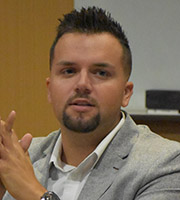
We can talk about family. We can talk about other things. But people want to feel like they’re a part of a winning team.
And Youngstown doesn’t do that as well. But we also don’t have as many opportunities as a bigger city. When people don’t feel as if they’re winning as an organization or they don’t feel like they’re winning as a team, they don’t feel they’re winning in life. So they seek other opportunities.
In the leadership world, people don’t often leave organizations. They leave leaders.
And if we’re not going to be the leaders in this, in this city that can promote that change, then we’ll never have change. I told my boss not too long ago, we were complaining about some things in the company that we would like to see change. And I said I wish that I could take some of the employees from our office who don’t get to travel as much as I do on a field trip to some of these more advanced cities. It would give them a glimpse of what this area could be.
This is what the area could be. This is what it feels like to be a part of something bigger than you, what it feels like to be a part of a winning team. It would also show them how big our organization is across the country.
When we’re just sitting at the headquarters office, you can talk about it, but you don’t feel it. And when people aren’t feeling the wins …
I often hear Youngstown is a poverty city. And the more we talk about it like that, the more people believe it. And like Nico was saying, from college all the way on, students are already planning on moving. That’s the conversation.
Business Journal: It’s also the reality. It is a poor town. Food deserts and health care deserts exist in Youngstown and Warren and the inner cities and suburbs have housing issues – which is why we need the leadership you can offer.
Bresnahan, DGPerry: I think we need to be champions for change. Change the narrative. Change how we try to attract people here. How do we make our friends who moved out of town think Youngstown isn’t so bad.
Look at what is going on. Look at the great public works that we’re putting in. Look at these huge companies that are moving into the Youngstown-Warren area.
One great thing about living in Youngstown is there’s such a strong connection. For the people who live here, I can say personally I’m very proud to be from Youngstown. You go somewhere and you’re wearing a YSU hat. You’re at an airport. Someone’s sees it and says. “Oh, is that Youngstown, Ohio?” There’s definitely a Youngstown connection.
That’s one of those strong things that we need to pull upon. “Hey, we’re from Youngstown.” It’s a steel city. We need to let people know that we have moved into the 21st century. It’s not a town that companies are moving out of. We have investments here.
There are great people here. We must get the story out.
Wright, Canvass America: I agree with what everyone has said about Youngstown. I always think of a quote: In every obstacle lies an opportunity. That fits Youngstown very well. … All the wonderful assets, like the Youngstown Incubator, the first 3D printing that was in Youngstown, and at Humtown. The many great places of nature we take for granted.
We need to find a way to make this conversation about Youngstown. These things are here and people can take advantage.
We don’t celebrate our wins as we should. That’s where the negativity comes. Everybody is so quick to harp on the bad things. But there are wonderful things in Youngstown.
Starting a business in Youngstown – it is one of the best places. It’s inexpensive. And for the most part, people celebrate and support the local businesses. But there need to be more.
Everybody wants to go to the bigger cities. But for me, I stayed here because of family and I also stayed because I’m very passionate about Youngstown. My entire life I’ve been here. I’ve never left. Why wouldn’t I want to see the place I call home grow?
Now we get to be those people who say: Hey, we took part in something that people gave up on. Because you hear all the time from the generation that’s much older than us, it’s just not a good place. It’s gone downhill. My generation always sees the potential.
That’s what our leadership here shows. We’re positive. And putting that positivity on Youngstown is going to make it much better for us.
Smith, YSU: I stayed for family and I stayed for opportunity. I have two redevelopment projects that I worked on in the city of Youngstown.
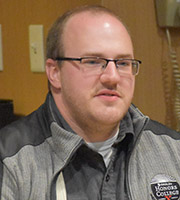
The city is tough. It’s a very tough city for a business to survive in because there’s so much poverty. However, the support from the community is the only thing that keeps me waking up and pushing every single day, working 100-, 120-hour weeks.
When I leave the university, I go work on my businesses. And I work on my business until midnight. I wake up at 4 a.m. and I do the same thing every day.
It’s very tough to do. But because of the community wanting us to stay, we stayed.
I came here with those businesses after I looked everywhere else. I worked very hard to look everywhere else before coming back to Youngstown. I knew I was going to be rooted in Youngstown but I could commute to Cleveland.
But it ended up that the Youngstown community brought opportunities that enabled us to redevelop two formerly vacant buildings and bring them back and become, not an economic hub, but a place for community to meet and get together.
So it’s tough. It’s very, very hard. But opportunity brought me back.
Business Journal: I’d like to challenge all of you. We agree on everything said so far. Many of you belong to organizations. [To Rickert] You have Penn-Northwest in Mercer County. We have the MVP, Mahoning Valley Young Professionals Club.
What are you going to do to advance the narrative? As a group, what kind of leadership can you coalesce to reach out to people? And can that be your task as part of your organization? How are you going to provide that leadership?
Rickert, Penn-Northwest: When we started, our goal was to help our peers and our friends get plugged into our local community. As everyone mentions, this is a great community with unlimited opportunity. We’re a lump of unmolded clay. We can shape in any direction we see fit.
But as we kept going, we heard lots of negative comments. And my goal, instead of ignoring them or dismissing them was: How can we solve this? As group of 35 young adults with only a little money, what can we do to change some of these issues?
Through the money we’ve raised, we’ve either addressed or we’ve advocated heavily within our community for the housing needs of young adults. That’s been a big struggle.
Advocating for the business and education communities to work together, to eliminate the silos, and again build this sense of community.
We have a significant amount of nonprofits. These organizations have been working very heavily to improve the quality of life here. How can we integrate young adults into boards and committees and get some fresh ideas flowing?
We’ve had some local champions that have been, driving the boat for 40, 50 years. Now it’s time to prepare the next generation to take off with the foundation they’ve built.
Tensley, Boardman Police: I’ve never seen a wild thing feel sorry for itself. It lived his whole life without ever feeling sorry for itself. It is important for us to understand that.
There have been many areas where this area has failed. But it’s important to understand that it’s OK. Now we have to move on.
I’ve heard you identify yourselves and name your organizations. I have lived here my entire life and I’ve never heard of them before. That’s a problem.
Because if I don’t know, then many residents don’t know. And so now my brain is spinning. You have access to this. You have access to that.
Youngstown has been flying with only one wing because the whole area isn’t unified. Education is crucial to getting ahead. It’s having people like you to sit down with young people and say: “These are the steps that you need to take.”
[Looks at Genova] You said you’d never been a business owner before. That’s a whole dynamic in itself but you’re doing it. [To the panel] These are the steps that you need to take. More internships, to be able to grab people to put them underneath their wing so Youngstown’s full body can actually move and run.We’re just a locomotive with no gears. I’m in awe because I hadn’t heard of some of these things. And right now a lot of kids just don’t know.
Business Journal: We want to stimulate you to work together, to somehow come together, not just for social events such as mixers, but to develop your own leadership as a group. Is the community welcoming your leadership?
Peplow, Jobs for Ohio’s Graduates: Something we’re playing a part in Trumbull County is our youth summer work program. This is in partnership with Trumbull County Job & Family Services.
For eight weeks we put youth on work sites. These are local businesses that have given to the community. They also give youth insight into their opportunities the community offers, namely, nonprofits that can’t afford full-time staff and the summer season tends to be a busy time for them.
They are going to these work sites. And we are the employer of record. So, they do get paid for their time. For 20 to 30 hours a week, they’re on a job site where they learn the skills needed, and then hopefully turn them into a career-based opportunity.
We highlight this constantly with Brite Energy Innovators. A youth was placed there as a summer intern. They liked her so much that after her eight weeks were up, they put her on their payroll and created a full-time position for her.
Our youth capitalize on these opportunities when there is a community organization behind them.
This is a great way to develop our leaders and get our youth to stay and sustain themselves as well.
Morgione, YSU: New Castle, Hermitage, Sharon. They’re one large area. So if I say Youngstown, it includes them.
To your point: There are many nonprofits. There are many groups, separately, going after the same cause. They need to come together.
Instead of reinventing the wheel and having a ton of different events for the same thing, make it big. Reach a larger audience. Get the message across. Still have your organization show how you differ but come together to reach that larger audience.
There is much that we can piggyback off of that we necessarily don’t. With all of our organizations, we can say that we’re a small community.
In terms of what we have, not many small communities have what we have: YBI, with the media market with WFMJ, WKBN, the concerts we have. Other smaller towns don’t have 20,000 people coming to Wean Park for Y-Live or the amphitheater or the Covelli Centre.
We’re an hour from Pittsburgh and Cleveland and everything they have going on; 40 minutes from Akron-Canton. …
One thing about getting the word out is coming together. Instead of creating something new, build on what’s already here.
MacMillan, Platz Realty: From what Nico said and what Kaneesha mentioned earlier regarding her surprise hearing about these organizations and resources; It gets harder and harder for every community, not just Youngstown – ours being a minor metro – when you have these platforms at kids’ fingertips where they’re watching influencers hundreds of miles away. It pushes the sense of community even further away.
So the challenge we’re facing is becoming more difficult as these global platforms continue to get bigger. We need to figure out how to access those kids’ minds and show them, give them a sense of community and figure out how we can do a better job sharing the available resources.
What I try to do personally is more of a spread-out strategy – get out there and talk to people in your day-to-day business development. Get to know somebody and introduce them to the resources you know exist in our market.
I have a handful of friends that have moved into our market because they married someone who was brought here into an engineering job and some of them have struggled coming from a bigger city. They say they don’t know what to do.
Send them the local tourism bureau websites, community calendars. There’s so much stuff you can do.
Wright, Canvass America: Kaneesha talked about education and learning about all the organizations and groups: being able to go into schools and talk to senior classes and junior classes. You have the Mahoning County Career & Technical Center.
If they have that opportunity to meet with different businesses, organizations, Mahoning Valley Young Professionals is where we open up. It’s a wide variety of people from all types of businesses and organizations. That would be something that interests them. And then they already get that jump start in learning. These organizations exist.
It’s being able to get in the schools because they have a tight frame of a day. If they can see the positivity that can come from the students learning so early, that’s crucial. I would love, as the Mahoning Valley Young Professionals, a lot of people here would have no issues about mentoring seniors in high school.
Having a person come from YSU … a police officer, someone from Platz … and mentor for a day would be amazing. The seniors would enjoy that. …
Being able to network, I wouldn’t have met Gina if it wasn’t for Mahoning Valley Young Professionals.
But hearing students say, “There’s no way that I can get out of this rut [the Mahoning Valley]. What can I do?”
And then there’s Gina, “Let me introduce you to her.”
The networking and the education need to be in force when they’re young. Because letting them graduate from high school and throwing them into college or into the workforce doesn’t give them guidance on anything.
Cretella, Trumbull Mental Health Board: I want to build on that and echo what everybody else is saying – the lack of awareness among young people. The narrative is that there are not opportunities here. And we as professionals, to say we’ve never heard of certain organizations, how do we expect our younger generation to be aware of them?
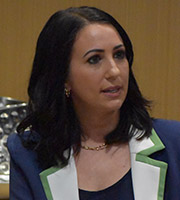
I love that you were talking about mentoring, whether it’s seniors in high school or individuals entering Youngstown State University. We must build that awareness of the opportunities. Because if you’re not even aware of the businesses that are thriving – Penguin City Beer’s doing fabulously, Youngstown Flea, all that they’re doing. There’s a lot of opportunity.
But does the younger generation see all that is happening? Or are they thinking of these large corporations? Are they thinking that because we don’t have as many large corporations as we used to, we’re failing?
Wright, Canvass America: Maybe that would get them to stay. Once they hear about it, why would they leave with all these opportunities here? It’s inexpensive to stay and also convenient.
Business Journal: I would challenge all of you and your clubs to create the networking environment that is needed. Because we need mentoring and internship networks. You’re all on the same page. Now you have to get out and do it. Rather than just get to know each other and socialize, you have to get out there and do it.
What about the 20-somethings who come back for family? People come back for the low cost of living. A lot of times that means you already have a partner. You’re married. You have family. But what about the single people in their 20s? How do they get connected to the community? And will they come back for the low cost of living when there’s a housing crisis?
Wolfe, Winner Aviation: When I travel around the country, I hear that all the time, that this area has a low cost of living. With a low cost of living, your job takes that into account when they come up with your salary.
You’re going to be offered significantly less than if you’re in a bigger town and the cost of living is not significantly much higher. You’re going to get a higher wage.
I don’t have an answer. Those types of things frustrate me. How do we change the mindset in this community? That question is rather large. Because there are so many things happening.
People are in a poverty mindset. They’re in survival mode. Covid just made it worse.
Getting people together. When we get into smaller rooms like this, we can come up with a solution. But to take that and market it and make everybody join hands and come together, they already have a poverty mindset. Not everybody, but a lot of people do. They’re already in survival mode. So what does that turn into? It’s not on purpose but everyone becomes selfish.
They’re after marketing for their own business, to grab what money is left. That’s how their minds run. My business isn’t doing well. Neither is theirs. I need to stay alive.
It’s not like that outside of Youngstown.
So when you’re talking about people staying or leaving, why does somebody want to come into a place where they’re going to make less money? Their house will be cheaper. But it’s still expensive. It’s still expensive to live here.
And so why would somebody want to move back here and add even more complexity into their life with the mindsets and the survival mode and all that brings. I’ve lived here my whole life but I do get to experience other towns and cities.
You’re not as free to do what you need to do and to grow. And job advancement-wise, at least in the corporate world, if you want to work in industry, there’s tons of jobs here.
But for those who want to advance in the corporate world, there’s not much here.
I hear complaints from college students that companies won’t hire them because they don’t have experience. How are you supposed to get experience if you never get your first job? So they move.
Nobody wants to give them a shot. I can relate to that. I’m 30 now and quite honestly, the generation above us still doesn’t listen to us. That’s just my opinion.
Sometimes I‘m guilty of thinking that way about the younger 20-year-olds. And I have to snap myself out of a trance because it can very well become normal.
Business Journal: You said that people aren’t listening. Let’s expand on that. What aren’t they hearing? What does my generation need to hear as we’re retiring or getting ready to retire? Or even the 45-year-olds, 50-year-olds, what aren’t we hearing?
Smith, YSU: We’re going to need more than the time we have left.
Tensley, Boardman Police: One thing we have to do is to address the mindsets of each generation. You come from the beginning. This is a man’s world and only the men can work. And then women are, OK, let’s go do it. We want to go ahead and do it – but it was only out of necessity. That’s the only reason why women went to work. The men were off at war.
Then you come into this new light and everyone’s, “Oh, let’s start learning about our rights and let’s start moving forward.” This became a unity.
Well, we’re fighting for unity, in the ’60s and ’70s. And then my mom and my dad are of the generation of where you better do what I told you to do because they’re the that’s-what-I-said-to-do generation. And then my generation: where, my mama told me to do that but I’m feeling this a little bit.
Whereas now the 20-year-olds are in the mindset of wanting to know why. You told me to do it. They’re going to challenge what you’re saying.
Wolfe, Winner Aviation: And it’s valid.
Tensley, Boardman Police: So you want me to do this why? I need to know why. Knowing why is so very important because it helps motivate me.
I’m in the United States Army. With me being in the Army, the one thing it tells us to stay focused during basic training is to remember what your why is. Because that helps you to get through the 10 weeks of rigorous training. My why was my son.
You articulating why this child needs to go to college or, why he may not need to go to college. Every child doesn’t need to go to college. Let’s focus on what’s best for this person. The majority of people made it by going to college. But there’s a good 10% or 20% who didn’t. …
We need to respect that.
Wolfe, Winner Aviation: It’s both sides. The younger generation doesn’t want to hear what the older generation is saying because they know it all. They feel that they can Google or YouTube it. But the older generation thinks the younger generation is immature and needs to be taught. There’s a tension there.
MacMillan, Platz Realty: I experienced that a lot in economic development. We’re a generation who saw the effect of steel mills depart. We’re here. They were already gone. We’re seeing opportunity and things are moving in the right direction.
But that [steel] generation is still in local government and making decisions. They carry this mentality that Tyler pointed to where, in their minds, the pie is getting smaller. So when there’s an opportunity to grab a slice, they take more than they need. That causes things to break down and eliminates collaboration.
Morgione, YSU: We’re all young leaders and we can evangelize in our own ways. But not just young leaders are needed to make other young leaders.
There’s no reason why the senior classes should not have a town hall at YSU where they get to hear from the mayor of Youngstown or any town in the region and understand the decisions made and how they’re made.
Because outside of us saying, “Here’s what we did and this is why,” really build on that, so the students feel they’re a part of something. Then they become like everybody in this room, they want to do more.
They think, this is going on in Youngstown and I think that it could go further. …
But there’s not a lot of diversity of age or generations in those rooms where decisions are made. It does seem like the largest share of the pie does get taken. It’s perpetuating because we’re not in the rooms and there’s not younger people in the rooms. So by the process of elimination, that’s going to continue happening.
YSU, the cities should be working together to put together a pamphlet for first-time homebuyers, listing the opportunities and for jobs that are open right now. Here’s grants you can get for owning a home and how to do it.
There’s no understanding of that being taught. You’re doing it yourself. To an extent, if you’re pushing everything that this area has, cities need to provide that information.
We’re a generation that can look something up and find it. But for some reason, if you look up what opportunities and grants are available to buy a home and the funding available you’ve got to dig through 750 sources before you find one. …
Genova, Vital Pelvic Health & Wellness: My perspective is a bit different because health care is still run from that mindset that’s been set by the older generations. It’s insurance-based driven, really traditional medical model.
And these younger generations who are struggling in health care. They can’t keep nurses at St. Elizabeth’s downtown. They’re going to Cleveland and Pittsburgh.
A piece of that is we are stuck in that older mindset of what health care is supposed to look like. You bill insurance this; you always use your insurance for this and that. I had to go against the grain and so I am completely out of network. That was a huge struggle for me because of the mindset of this area, that older mindset of you bill insurance.
If you go to therapy, it’s a $15 copay. You go for 20 minutes and you see a high school student who puts a hot pack on you. That’s what therapy is.
And that’s a really old mindset. But a lot of people who own these medical corporations and clinics are from an older generation.
We need a shake-up from younger people who have another perspective of what health care could look like: not paying a whole bunch of money each month to then pay a whole bunch of money for your health care and it be very, very subpar.
Where will we get the kind of leadership to support people pushing against that traditional medical model to provide different types of health care? It wasn’t easy for me to go completely outside of that because we are a very insurance-based region.
That could change. That mindset is really, really behind the times.
Cleveland’s seeing a resurgence in these out-of-network cash-based clinics, doctors who are direct primary care doctors. Same with Pittsburgh. We’re just really behind here. Which is an opportunity.
But the people who own these big clinics are in that older generation. It’s hard for them to wrap their heads around this new model that I have.
Business Journal: Final thoughts?
Peplow, Jobs for Ohio’s Graduates: As someone who works in the education system, what I see from the older generation is the lack of trying to understand the younger generation. The line I hear a lot is, “When I was a kid, I used to play outside till the street lights came on. Now kids sit inside on their tablets.”
As a mother, I want my kids inside on tablets because they’re safe. There’s no safety, unfortunately, in some of our more challenging communities. Instead of lamenting it, I’m happy for comparison or conversation.
Yes, I want to know how you did something. To our older mentors in our school system: I want to know how you did it. But don’t look at young people as if they’re doing something wrong. Try to get on their level. Match it. Then see how you can help that youth build their mindset.
That makes them feel more cared for and gives their education more value. It will help them want to remain in this area.
Wolfe, Winner Aviation: I recently read where Generation Z is not looking for a job that can advance them more than they’re looking for a job that will mentor them into the next season of their life. But we can’t do it alone. We can’t do it with just one nonprofit, one company that decides to make a change. The mindset of this community has to shift. Or we’ll either stay the same and stay stagnant or people will continue to leave and people won’t come back.
Bresnahan, DGPerry: As someone who moved back as a 20-something, one thing that set me up for success was inclusion, being invited to things, being asked for my opinion. What we need to do for the next generation is to include them.
Ask them to go to an event with you. At work, ask for their opinion. Take them under your wing as a mentor. That’s what we need to task ourselves with to change the narrative on Youngstown.
Cretella, Trumbull Mental Health Board: I would build on that because going back to mentoring, those coming into the professions, looking at the other generations that are mentoring millennials and mentoring younger professionals, I’ve been blessed to work under great leaders that have taken a risk on me.
What other organizations are willing to cultivate young leaders? There’s work to be done among our generation of building the leaders in the community before we can start moving to the generation entering college.
Tensley, Boardman Police Dept.: Personally I’m just excited. Hearing everyone talk. Innovation is in the air. I’m taking everything everybody says as self-evaluation so that I can continue to be the change. I’m just ready. I’m moving along with you. The key is education.
MacMillan, Platz Realty: The mindset is definitely changing. You see an insane level of collaboration. There are a lot of incredible organizations in our market working to do great things.
The hardest challenge is getting that information out to the people who don’t feel connected to the community. They feel they’re outside looking in.
So we’ve got to beat our way toward them.
Wright, Canvass America: We were talking about older generations. We want their support and we need their support. They’ve seen things that we haven’t seen, we’ve only heard of. And so with us trying to build the Valley, we want their input. We want them to hear us out.
Obviously there will be times we fail. Nobody wants to fail. Sometimes failure lies on your way to success. Listen to us. Hear us. Give advice. But don’t criticize us and think that we’re the generation who can’t do anything. We are here and it is our turn to be that force.
Smith, YSU: One thing we can never have too much of is communication and coming to a shared understanding about what your employee is going through, what your mentor or boss is going through.
We have an 80/20 economy right now. Eighty percent of our local economy is not us. It is those younger or older than us. Understanding how we survive in that middle, in that small piece, we need the 80% of cheerleaders encouraging us, helping us pull ourselves up by the boot straps if we’re entrepreneurs, helping us grow as professionals if that’s our lane.
In corporate jobs, understanding where we’re at and having those conversations with us and taking the time to encourage us instead of saying, “Oh, these kids these days.” That gives me the chills.
Instead say, “These kids these days are trying to do something cool. How can I help them achieve that? How can I get behind the fence and start pushing it?”
The more we all pull each other up, the more the whole thing works.
Morgione, YSU: Building on what we’ve heard, the mindset has 100% changed. I’m 24 years old, looking at downtown Youngstown 10 years ago versus today. It’s a totally different landscape.
To push back on the narrative that it’s the older generations not listening to us, it’s naive to think that it’s just them. We also don’t take into consideration what we’re hearing and understand what they’ve seen.
That’s a very important key. The younger generation is like, “What do they know? They’re crazy. The older generation is, “They have no experience. They’re too young. How could they know?”
It’s like everything else. We need to somehow break that barrier and come together. We need to always understand where everyone is coming from. As long as we recognize that, there is a way to bridge that gap.
Genova, Vital Pelvic Health & Wellness: A lot of people my age, including my brother, who’s lived in Cleveland, Chicago, Cincinnati, are coming back to Youngstown. So that’s a good thing.
One thing that I take away from today is how the younger generation [needs] mentorship and experience. How can we set them up for that?
I would love to be part of that. I just want to challenge the thinking so it includes the small businesses. I’m an owner. I’m the social media manager. I make all of our print material. I also do all of the events. I’m also the therapist. I’m the hiring person.
There’s so much opportunity for people to come into my clinic and learn all different things. They can do social media. They can do events. They could do the therapy part, the administrative part. It’s very challenging for small businesses to have the bandwidth to take on mentors, to even organize what time they’re going to be there. That would be on me. I don’t have time for that.
I have many students who reach out, who want to be mentored, who want to come into my clinic. But small businesses don’t have an employee who can triage all of that. So how can we make that work?
If we go forward, which we should, it’s harder for small businesses than it is for established corporations to offer mentors. Much as we want to, we would love to. We could use all kinds of insights from the younger generations.
Rickert: Everything goes back to economic development. What does it look like to achieve economic prosperity for our region? The previous model was to build a business and the employees will come. We’ve operated like that for a long time. Steel plants could pop up, put an ad in the paper, by next Tuesday they’d have most of their jobs filled.
That model is flipped entirely upside down. Now it’s attract potential workforce and the businesses will come. You’re seeing it in Austin, Texas. That’s a great example.
They’re focused on community. They’re bringing in 50,000 people a year. Businesses, new housing, new industry, new culture can’t spawn fast enough.
As we continue to focus on this, building this culture, attracting the people, we’re going to see great prosperity in our region.
How do we bring back our friends? How do we retain the people we have, who are attending the colleges in our region? Many people have built businesses here – and families have built their homes. There’s very few people that have ever built a community. Our region has a unique opportunity for young men and women under the age of 35 to have a say and drive the direction of how our community is going to be built.
Pictured at top: Eleven young professionals under the age of 35 were selected to offer insights during our Next Generation Rountable. They are, from left: Paige Genova, Tyler Wolfe, Gina Peplow, Nico Morgione, ShoMoré Wright, Jacob Rickert, Kaneesha Tensley, Levi Smith, Katie Cretella, Shea MacMillan and Betsy Bresnahan.
